Taxation of Foreign Investments in the Australian Agricultural Sector
VerifiedAdded on 2022/11/28
|9
|2410
|498
Report
AI Summary
This report delves into the complexities of taxation concerning foreign investments within Australia's agricultural sector. It explores the controversial aspects surrounding foreign investments, particularly the approvals needed and the balance between public concerns and the economic benefits. The paper examines the definition of 'foreigner' under Australian tax law, contrasting tax treatments for foreigners and residents. It analyzes the role of the Foreign Investments Review Board (FIRB) and the Australian Taxation Office (ATO), discussing tax implications, transfer pricing regulations, and the impact of foreign investments on the Australian economy. The report also provides recommendations for tax reforms, addressing issues such as uniformity in taxation policies and the potential for tax avoidance strategies by foreign entities. The report includes a comprehensive discussion of the tax treatments applied to foreign investors in the Australian agricultural sector, the implications of those treatments, and recommendations for reform. The findings are supported by relevant literature and analysis of current tax regulations. The report aims to inform readers about the current state of taxation related to foreign investments in the agricultural sector in Australia.
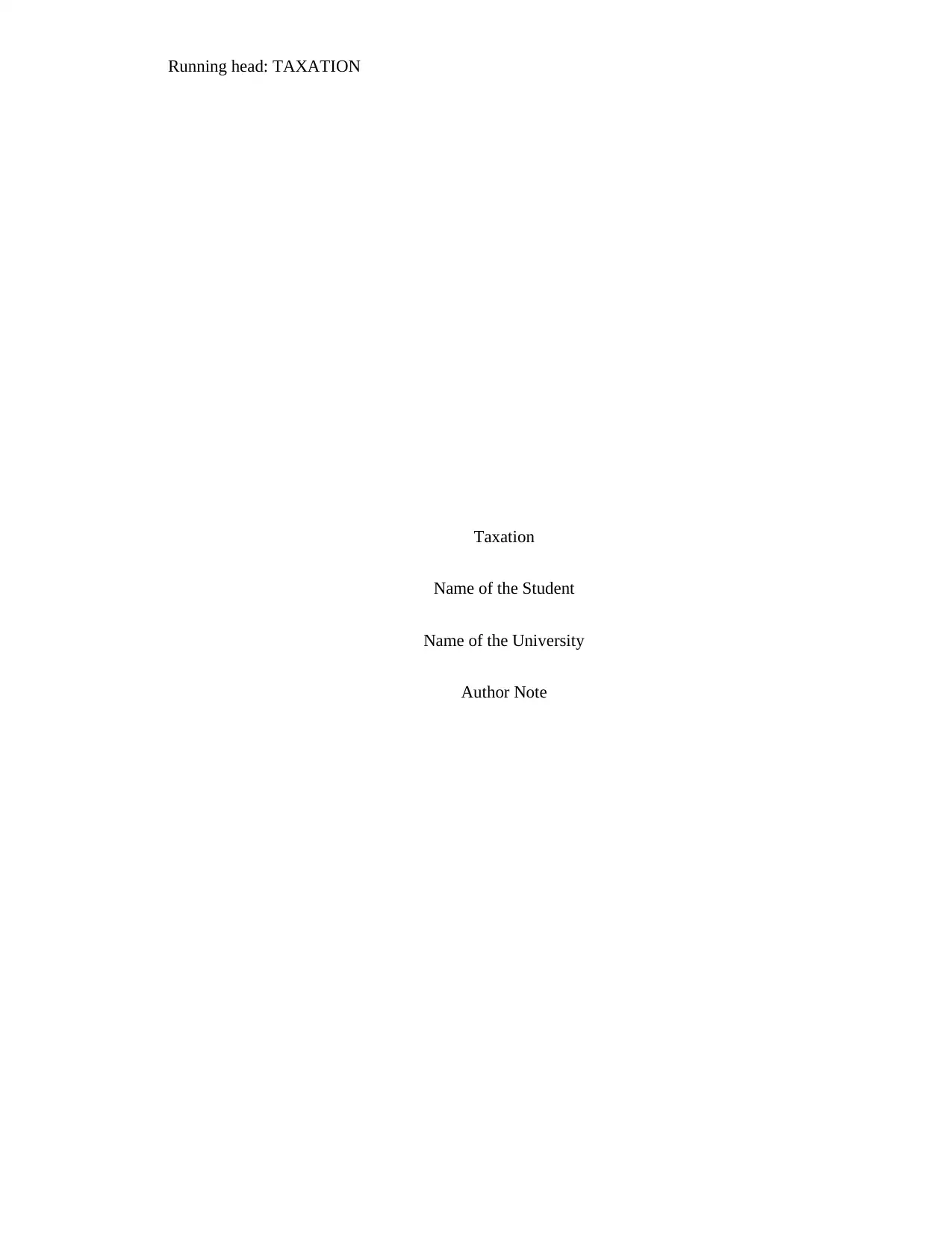
Running head: TAXATION
Taxation
Name of the Student
Name of the University
Author Note
Taxation
Name of the Student
Name of the University
Author Note
Paraphrase This Document
Need a fresh take? Get an instant paraphrase of this document with our AI Paraphraser
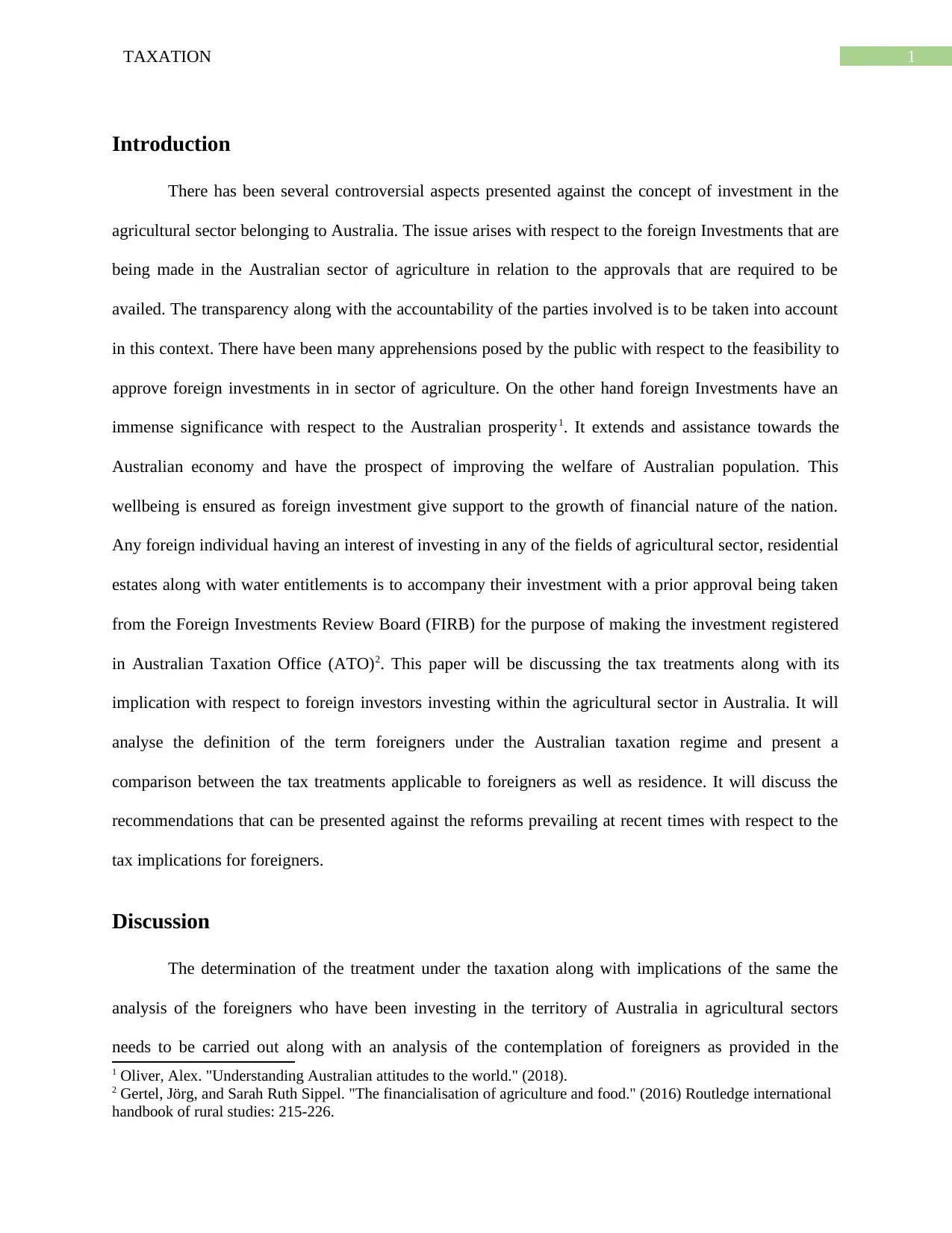
1TAXATION
Introduction
There has been several controversial aspects presented against the concept of investment in the
agricultural sector belonging to Australia. The issue arises with respect to the foreign Investments that are
being made in the Australian sector of agriculture in relation to the approvals that are required to be
availed. The transparency along with the accountability of the parties involved is to be taken into account
in this context. There have been many apprehensions posed by the public with respect to the feasibility to
approve foreign investments in in sector of agriculture. On the other hand foreign Investments have an
immense significance with respect to the Australian prosperity1. It extends and assistance towards the
Australian economy and have the prospect of improving the welfare of Australian population. This
wellbeing is ensured as foreign investment give support to the growth of financial nature of the nation.
Any foreign individual having an interest of investing in any of the fields of agricultural sector, residential
estates along with water entitlements is to accompany their investment with a prior approval being taken
from the Foreign Investments Review Board (FIRB) for the purpose of making the investment registered
in Australian Taxation Office (ATO)2. This paper will be discussing the tax treatments along with its
implication with respect to foreign investors investing within the agricultural sector in Australia. It will
analyse the definition of the term foreigners under the Australian taxation regime and present a
comparison between the tax treatments applicable to foreigners as well as residence. It will discuss the
recommendations that can be presented against the reforms prevailing at recent times with respect to the
tax implications for foreigners.
Discussion
The determination of the treatment under the taxation along with implications of the same the
analysis of the foreigners who have been investing in the territory of Australia in agricultural sectors
needs to be carried out along with an analysis of the contemplation of foreigners as provided in the
1 Oliver, Alex. "Understanding Australian attitudes to the world." (2018).
2 Gertel, Jörg, and Sarah Ruth Sippel. "The financialisation of agriculture and food." (2016) Routledge international
handbook of rural studies: 215-226.
Introduction
There has been several controversial aspects presented against the concept of investment in the
agricultural sector belonging to Australia. The issue arises with respect to the foreign Investments that are
being made in the Australian sector of agriculture in relation to the approvals that are required to be
availed. The transparency along with the accountability of the parties involved is to be taken into account
in this context. There have been many apprehensions posed by the public with respect to the feasibility to
approve foreign investments in in sector of agriculture. On the other hand foreign Investments have an
immense significance with respect to the Australian prosperity1. It extends and assistance towards the
Australian economy and have the prospect of improving the welfare of Australian population. This
wellbeing is ensured as foreign investment give support to the growth of financial nature of the nation.
Any foreign individual having an interest of investing in any of the fields of agricultural sector, residential
estates along with water entitlements is to accompany their investment with a prior approval being taken
from the Foreign Investments Review Board (FIRB) for the purpose of making the investment registered
in Australian Taxation Office (ATO)2. This paper will be discussing the tax treatments along with its
implication with respect to foreign investors investing within the agricultural sector in Australia. It will
analyse the definition of the term foreigners under the Australian taxation regime and present a
comparison between the tax treatments applicable to foreigners as well as residence. It will discuss the
recommendations that can be presented against the reforms prevailing at recent times with respect to the
tax implications for foreigners.
Discussion
The determination of the treatment under the taxation along with implications of the same the
analysis of the foreigners who have been investing in the territory of Australia in agricultural sectors
needs to be carried out along with an analysis of the contemplation of foreigners as provided in the
1 Oliver, Alex. "Understanding Australian attitudes to the world." (2018).
2 Gertel, Jörg, and Sarah Ruth Sippel. "The financialisation of agriculture and food." (2016) Routledge international
handbook of rural studies: 215-226.
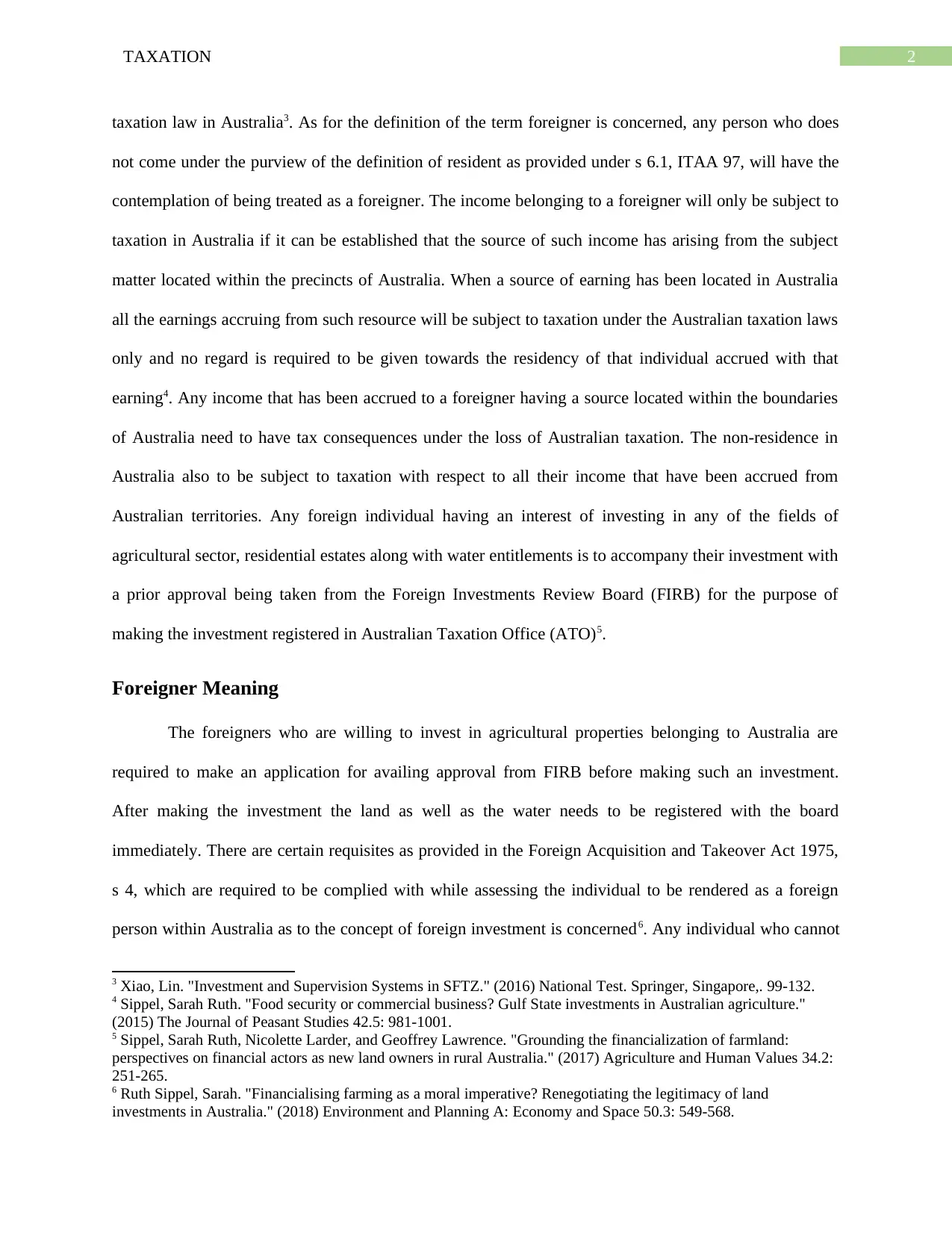
2TAXATION
taxation law in Australia3. As for the definition of the term foreigner is concerned, any person who does
not come under the purview of the definition of resident as provided under s 6.1, ITAA 97, will have the
contemplation of being treated as a foreigner. The income belonging to a foreigner will only be subject to
taxation in Australia if it can be established that the source of such income has arising from the subject
matter located within the precincts of Australia. When a source of earning has been located in Australia
all the earnings accruing from such resource will be subject to taxation under the Australian taxation laws
only and no regard is required to be given towards the residency of that individual accrued with that
earning4. Any income that has been accrued to a foreigner having a source located within the boundaries
of Australia need to have tax consequences under the loss of Australian taxation. The non-residence in
Australia also to be subject to taxation with respect to all their income that have been accrued from
Australian territories. Any foreign individual having an interest of investing in any of the fields of
agricultural sector, residential estates along with water entitlements is to accompany their investment with
a prior approval being taken from the Foreign Investments Review Board (FIRB) for the purpose of
making the investment registered in Australian Taxation Office (ATO)5.
Foreigner Meaning
The foreigners who are willing to invest in agricultural properties belonging to Australia are
required to make an application for availing approval from FIRB before making such an investment.
After making the investment the land as well as the water needs to be registered with the board
immediately. There are certain requisites as provided in the Foreign Acquisition and Takeover Act 1975,
s 4, which are required to be complied with while assessing the individual to be rendered as a foreign
person within Australia as to the concept of foreign investment is concerned6. Any individual who cannot
3 Xiao, Lin. "Investment and Supervision Systems in SFTZ." (2016) National Test. Springer, Singapore,. 99-132.
4 Sippel, Sarah Ruth. "Food security or commercial business? Gulf State investments in Australian agriculture."
(2015) The Journal of Peasant Studies 42.5: 981-1001.
5 Sippel, Sarah Ruth, Nicolette Larder, and Geoffrey Lawrence. "Grounding the financialization of farmland:
perspectives on financial actors as new land owners in rural Australia." (2017) Agriculture and Human Values 34.2:
251-265.
6 Ruth Sippel, Sarah. "Financialising farming as a moral imperative? Renegotiating the legitimacy of land
investments in Australia." (2018) Environment and Planning A: Economy and Space 50.3: 549-568.
taxation law in Australia3. As for the definition of the term foreigner is concerned, any person who does
not come under the purview of the definition of resident as provided under s 6.1, ITAA 97, will have the
contemplation of being treated as a foreigner. The income belonging to a foreigner will only be subject to
taxation in Australia if it can be established that the source of such income has arising from the subject
matter located within the precincts of Australia. When a source of earning has been located in Australia
all the earnings accruing from such resource will be subject to taxation under the Australian taxation laws
only and no regard is required to be given towards the residency of that individual accrued with that
earning4. Any income that has been accrued to a foreigner having a source located within the boundaries
of Australia need to have tax consequences under the loss of Australian taxation. The non-residence in
Australia also to be subject to taxation with respect to all their income that have been accrued from
Australian territories. Any foreign individual having an interest of investing in any of the fields of
agricultural sector, residential estates along with water entitlements is to accompany their investment with
a prior approval being taken from the Foreign Investments Review Board (FIRB) for the purpose of
making the investment registered in Australian Taxation Office (ATO)5.
Foreigner Meaning
The foreigners who are willing to invest in agricultural properties belonging to Australia are
required to make an application for availing approval from FIRB before making such an investment.
After making the investment the land as well as the water needs to be registered with the board
immediately. There are certain requisites as provided in the Foreign Acquisition and Takeover Act 1975,
s 4, which are required to be complied with while assessing the individual to be rendered as a foreign
person within Australia as to the concept of foreign investment is concerned6. Any individual who cannot
3 Xiao, Lin. "Investment and Supervision Systems in SFTZ." (2016) National Test. Springer, Singapore,. 99-132.
4 Sippel, Sarah Ruth. "Food security or commercial business? Gulf State investments in Australian agriculture."
(2015) The Journal of Peasant Studies 42.5: 981-1001.
5 Sippel, Sarah Ruth, Nicolette Larder, and Geoffrey Lawrence. "Grounding the financialization of farmland:
perspectives on financial actors as new land owners in rural Australia." (2017) Agriculture and Human Values 34.2:
251-265.
6 Ruth Sippel, Sarah. "Financialising farming as a moral imperative? Renegotiating the legitimacy of land
investments in Australia." (2018) Environment and Planning A: Economy and Space 50.3: 549-568.
⊘ This is a preview!⊘
Do you want full access?
Subscribe today to unlock all pages.

Trusted by 1+ million students worldwide
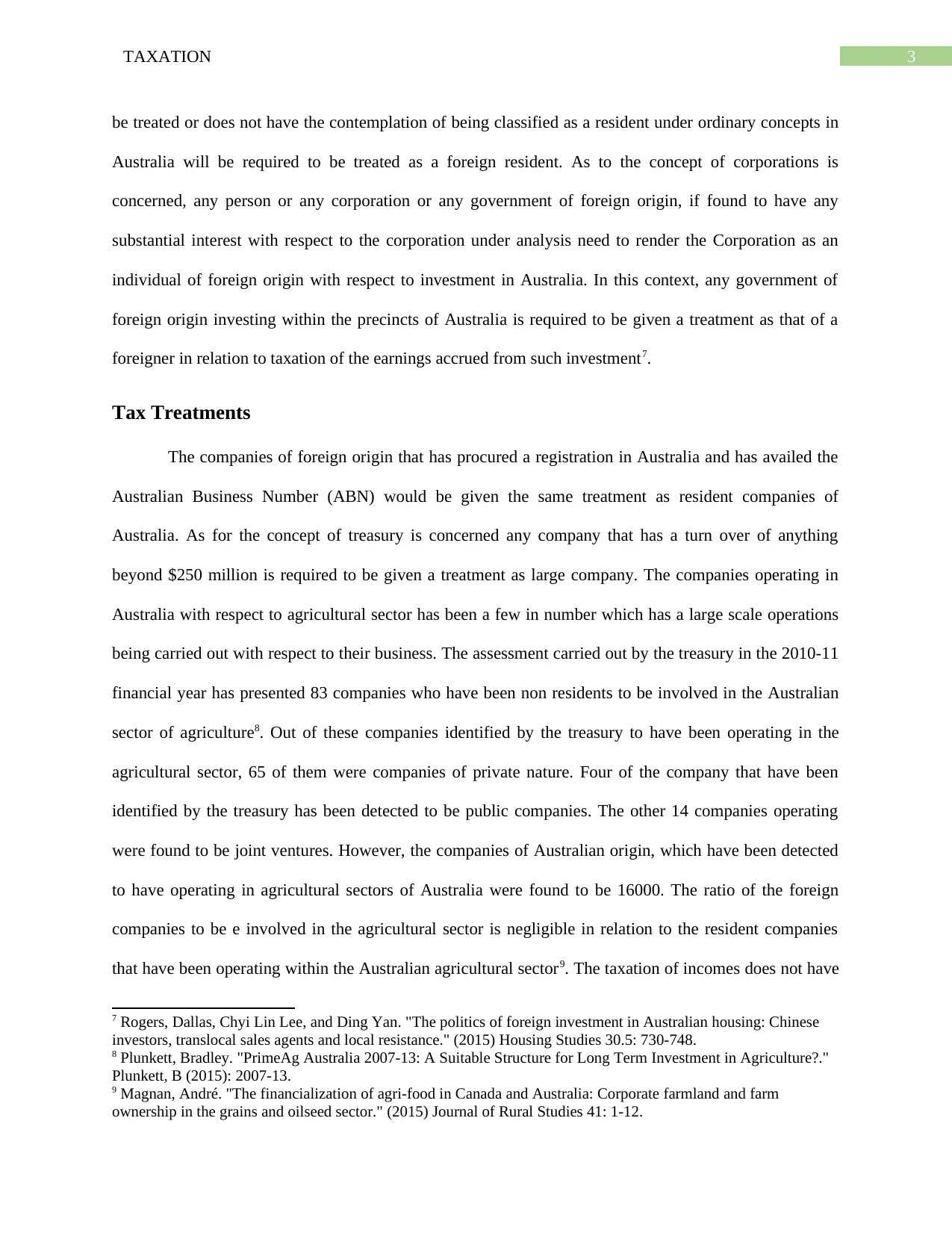
3TAXATION
be treated or does not have the contemplation of being classified as a resident under ordinary concepts in
Australia will be required to be treated as a foreign resident. As to the concept of corporations is
concerned, any person or any corporation or any government of foreign origin, if found to have any
substantial interest with respect to the corporation under analysis need to render the Corporation as an
individual of foreign origin with respect to investment in Australia. In this context, any government of
foreign origin investing within the precincts of Australia is required to be given a treatment as that of a
foreigner in relation to taxation of the earnings accrued from such investment7.
Tax Treatments
The companies of foreign origin that has procured a registration in Australia and has availed the
Australian Business Number (ABN) would be given the same treatment as resident companies of
Australia. As for the concept of treasury is concerned any company that has a turn over of anything
beyond $250 million is required to be given a treatment as large company. The companies operating in
Australia with respect to agricultural sector has been a few in number which has a large scale operations
being carried out with respect to their business. The assessment carried out by the treasury in the 2010-11
financial year has presented 83 companies who have been non residents to be involved in the Australian
sector of agriculture8. Out of these companies identified by the treasury to have been operating in the
agricultural sector, 65 of them were companies of private nature. Four of the company that have been
identified by the treasury has been detected to be public companies. The other 14 companies operating
were found to be joint ventures. However, the companies of Australian origin, which have been detected
to have operating in agricultural sectors of Australia were found to be 16000. The ratio of the foreign
companies to be e involved in the agricultural sector is negligible in relation to the resident companies
that have been operating within the Australian agricultural sector9. The taxation of incomes does not have
7 Rogers, Dallas, Chyi Lin Lee, and Ding Yan. "The politics of foreign investment in Australian housing: Chinese
investors, translocal sales agents and local resistance." (2015) Housing Studies 30.5: 730-748.
8 Plunkett, Bradley. "PrimeAg Australia 2007-13: A Suitable Structure for Long Term Investment in Agriculture?."
Plunkett, B (2015): 2007-13.
9 Magnan, André. "The financialization of agri-food in Canada and Australia: Corporate farmland and farm
ownership in the grains and oilseed sector." (2015) Journal of Rural Studies 41: 1-12.
be treated or does not have the contemplation of being classified as a resident under ordinary concepts in
Australia will be required to be treated as a foreign resident. As to the concept of corporations is
concerned, any person or any corporation or any government of foreign origin, if found to have any
substantial interest with respect to the corporation under analysis need to render the Corporation as an
individual of foreign origin with respect to investment in Australia. In this context, any government of
foreign origin investing within the precincts of Australia is required to be given a treatment as that of a
foreigner in relation to taxation of the earnings accrued from such investment7.
Tax Treatments
The companies of foreign origin that has procured a registration in Australia and has availed the
Australian Business Number (ABN) would be given the same treatment as resident companies of
Australia. As for the concept of treasury is concerned any company that has a turn over of anything
beyond $250 million is required to be given a treatment as large company. The companies operating in
Australia with respect to agricultural sector has been a few in number which has a large scale operations
being carried out with respect to their business. The assessment carried out by the treasury in the 2010-11
financial year has presented 83 companies who have been non residents to be involved in the Australian
sector of agriculture8. Out of these companies identified by the treasury to have been operating in the
agricultural sector, 65 of them were companies of private nature. Four of the company that have been
identified by the treasury has been detected to be public companies. The other 14 companies operating
were found to be joint ventures. However, the companies of Australian origin, which have been detected
to have operating in agricultural sectors of Australia were found to be 16000. The ratio of the foreign
companies to be e involved in the agricultural sector is negligible in relation to the resident companies
that have been operating within the Australian agricultural sector9. The taxation of incomes does not have
7 Rogers, Dallas, Chyi Lin Lee, and Ding Yan. "The politics of foreign investment in Australian housing: Chinese
investors, translocal sales agents and local resistance." (2015) Housing Studies 30.5: 730-748.
8 Plunkett, Bradley. "PrimeAg Australia 2007-13: A Suitable Structure for Long Term Investment in Agriculture?."
Plunkett, B (2015): 2007-13.
9 Magnan, André. "The financialization of agri-food in Canada and Australia: Corporate farmland and farm
ownership in the grains and oilseed sector." (2015) Journal of Rural Studies 41: 1-12.
Paraphrase This Document
Need a fresh take? Get an instant paraphrase of this document with our AI Paraphraser
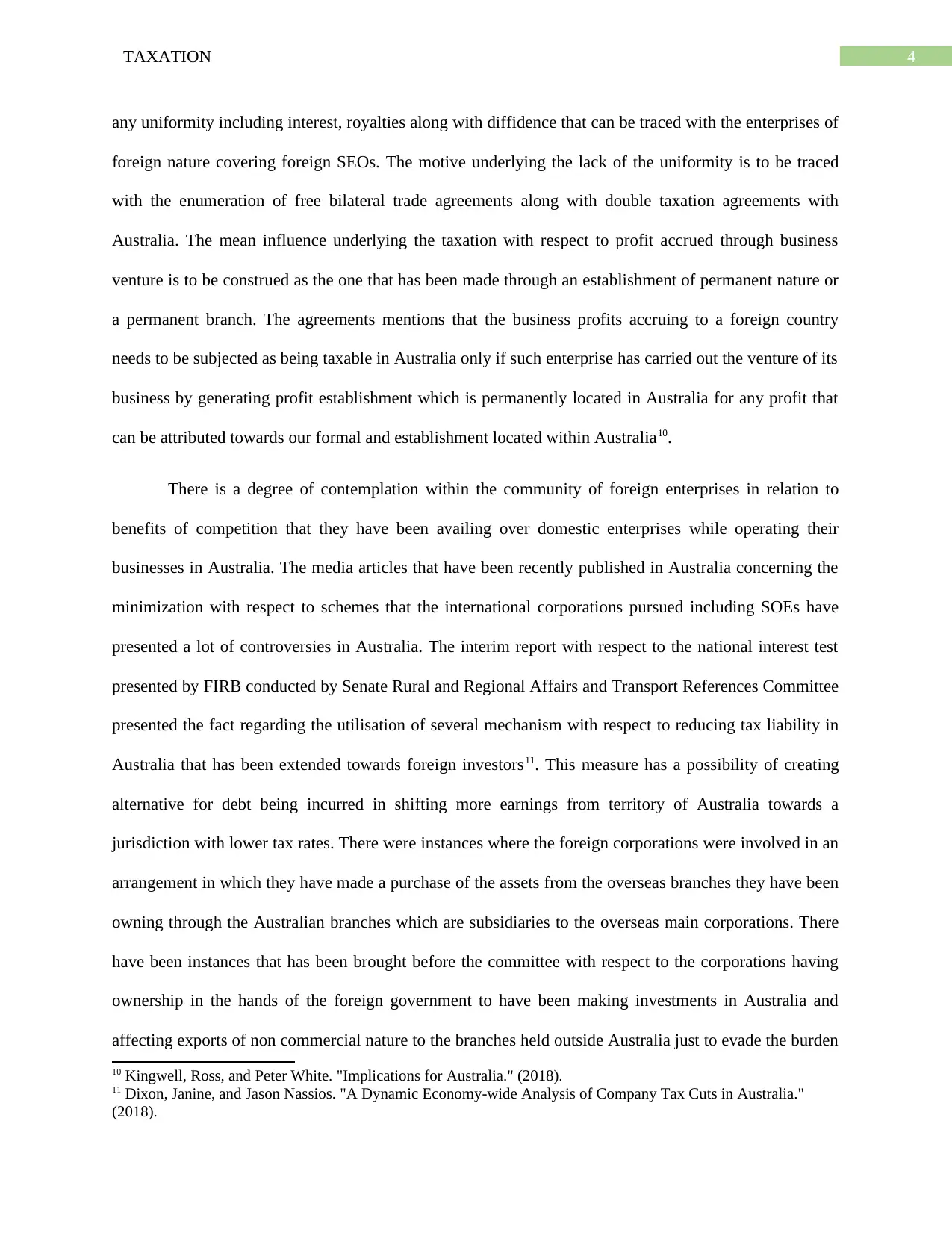
4TAXATION
any uniformity including interest, royalties along with diffidence that can be traced with the enterprises of
foreign nature covering foreign SEOs. The motive underlying the lack of the uniformity is to be traced
with the enumeration of free bilateral trade agreements along with double taxation agreements with
Australia. The mean influence underlying the taxation with respect to profit accrued through business
venture is to be construed as the one that has been made through an establishment of permanent nature or
a permanent branch. The agreements mentions that the business profits accruing to a foreign country
needs to be subjected as being taxable in Australia only if such enterprise has carried out the venture of its
business by generating profit establishment which is permanently located in Australia for any profit that
can be attributed towards our formal and establishment located within Australia10.
There is a degree of contemplation within the community of foreign enterprises in relation to
benefits of competition that they have been availing over domestic enterprises while operating their
businesses in Australia. The media articles that have been recently published in Australia concerning the
minimization with respect to schemes that the international corporations pursued including SOEs have
presented a lot of controversies in Australia. The interim report with respect to the national interest test
presented by FIRB conducted by Senate Rural and Regional Affairs and Transport References Committee
presented the fact regarding the utilisation of several mechanism with respect to reducing tax liability in
Australia that has been extended towards foreign investors11. This measure has a possibility of creating
alternative for debt being incurred in shifting more earnings from territory of Australia towards a
jurisdiction with lower tax rates. There were instances where the foreign corporations were involved in an
arrangement in which they have made a purchase of the assets from the overseas branches they have been
owning through the Australian branches which are subsidiaries to the overseas main corporations. There
have been instances that has been brought before the committee with respect to the corporations having
ownership in the hands of the foreign government to have been making investments in Australia and
affecting exports of non commercial nature to the branches held outside Australia just to evade the burden
10 Kingwell, Ross, and Peter White. "Implications for Australia." (2018).
11 Dixon, Janine, and Jason Nassios. "A Dynamic Economy-wide Analysis of Company Tax Cuts in Australia."
(2018).
any uniformity including interest, royalties along with diffidence that can be traced with the enterprises of
foreign nature covering foreign SEOs. The motive underlying the lack of the uniformity is to be traced
with the enumeration of free bilateral trade agreements along with double taxation agreements with
Australia. The mean influence underlying the taxation with respect to profit accrued through business
venture is to be construed as the one that has been made through an establishment of permanent nature or
a permanent branch. The agreements mentions that the business profits accruing to a foreign country
needs to be subjected as being taxable in Australia only if such enterprise has carried out the venture of its
business by generating profit establishment which is permanently located in Australia for any profit that
can be attributed towards our formal and establishment located within Australia10.
There is a degree of contemplation within the community of foreign enterprises in relation to
benefits of competition that they have been availing over domestic enterprises while operating their
businesses in Australia. The media articles that have been recently published in Australia concerning the
minimization with respect to schemes that the international corporations pursued including SOEs have
presented a lot of controversies in Australia. The interim report with respect to the national interest test
presented by FIRB conducted by Senate Rural and Regional Affairs and Transport References Committee
presented the fact regarding the utilisation of several mechanism with respect to reducing tax liability in
Australia that has been extended towards foreign investors11. This measure has a possibility of creating
alternative for debt being incurred in shifting more earnings from territory of Australia towards a
jurisdiction with lower tax rates. There were instances where the foreign corporations were involved in an
arrangement in which they have made a purchase of the assets from the overseas branches they have been
owning through the Australian branches which are subsidiaries to the overseas main corporations. There
have been instances that has been brought before the committee with respect to the corporations having
ownership in the hands of the foreign government to have been making investments in Australia and
affecting exports of non commercial nature to the branches held outside Australia just to evade the burden
10 Kingwell, Ross, and Peter White. "Implications for Australia." (2018).
11 Dixon, Janine, and Jason Nassios. "A Dynamic Economy-wide Analysis of Company Tax Cuts in Australia."
(2018).
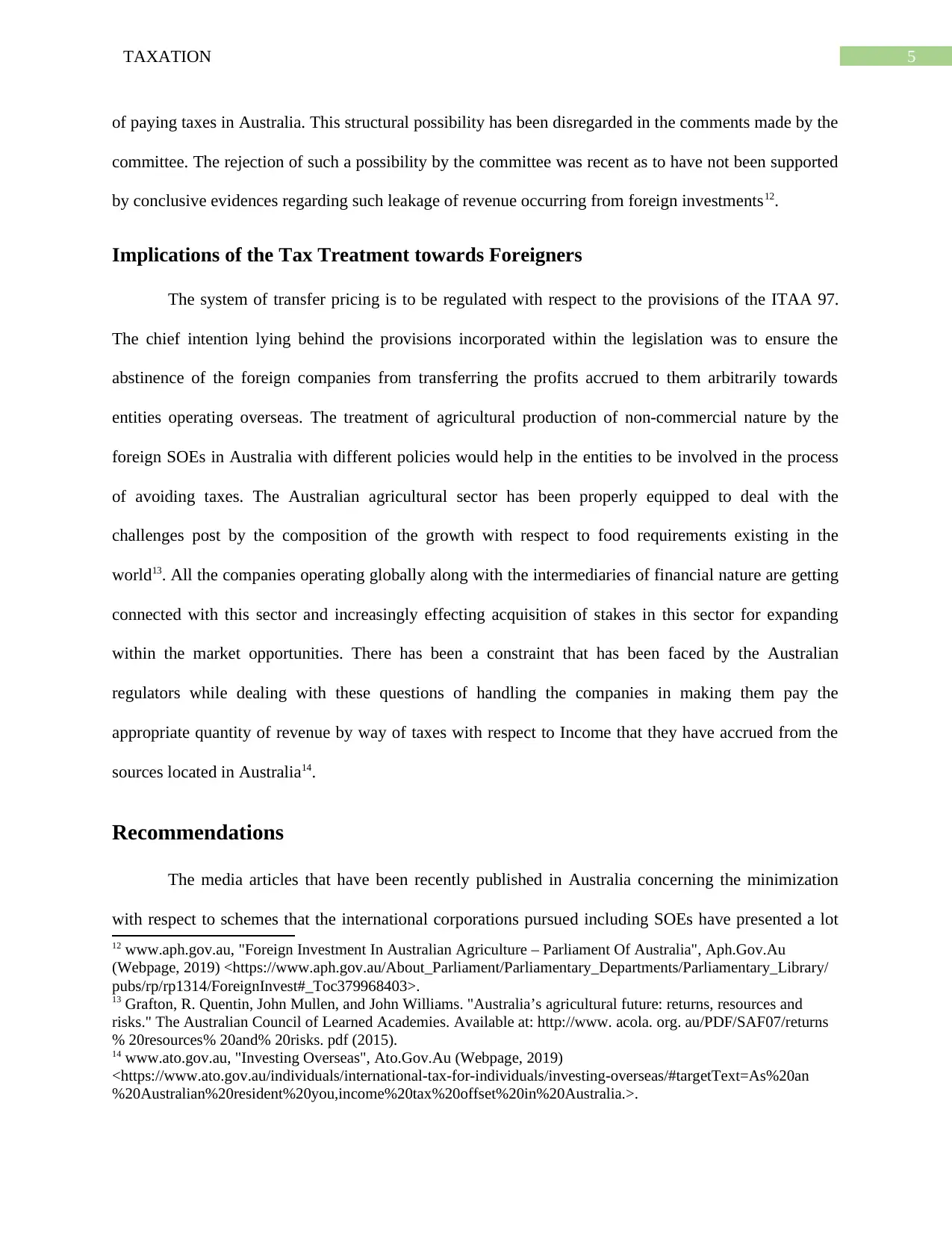
5TAXATION
of paying taxes in Australia. This structural possibility has been disregarded in the comments made by the
committee. The rejection of such a possibility by the committee was recent as to have not been supported
by conclusive evidences regarding such leakage of revenue occurring from foreign investments12.
Implications of the Tax Treatment towards Foreigners
The system of transfer pricing is to be regulated with respect to the provisions of the ITAA 97.
The chief intention lying behind the provisions incorporated within the legislation was to ensure the
abstinence of the foreign companies from transferring the profits accrued to them arbitrarily towards
entities operating overseas. The treatment of agricultural production of non-commercial nature by the
foreign SOEs in Australia with different policies would help in the entities to be involved in the process
of avoiding taxes. The Australian agricultural sector has been properly equipped to deal with the
challenges post by the composition of the growth with respect to food requirements existing in the
world13. All the companies operating globally along with the intermediaries of financial nature are getting
connected with this sector and increasingly effecting acquisition of stakes in this sector for expanding
within the market opportunities. There has been a constraint that has been faced by the Australian
regulators while dealing with these questions of handling the companies in making them pay the
appropriate quantity of revenue by way of taxes with respect to Income that they have accrued from the
sources located in Australia14.
Recommendations
The media articles that have been recently published in Australia concerning the minimization
with respect to schemes that the international corporations pursued including SOEs have presented a lot
12 www.aph.gov.au, "Foreign Investment In Australian Agriculture – Parliament Of Australia", Aph.Gov.Au
(Webpage, 2019) <https://www.aph.gov.au/About_Parliament/Parliamentary_Departments/Parliamentary_Library/
pubs/rp/rp1314/ForeignInvest#_Toc379968403>.
13 Grafton, R. Quentin, John Mullen, and John Williams. "Australia’s agricultural future: returns, resources and
risks." The Australian Council of Learned Academies. Available at: http://www. acola. org. au/PDF/SAF07/returns
% 20resources% 20and% 20risks. pdf (2015).
14 www.ato.gov.au, "Investing Overseas", Ato.Gov.Au (Webpage, 2019)
<https://www.ato.gov.au/individuals/international-tax-for-individuals/investing-overseas/#targetText=As%20an
%20Australian%20resident%20you,income%20tax%20offset%20in%20Australia.>.
of paying taxes in Australia. This structural possibility has been disregarded in the comments made by the
committee. The rejection of such a possibility by the committee was recent as to have not been supported
by conclusive evidences regarding such leakage of revenue occurring from foreign investments12.
Implications of the Tax Treatment towards Foreigners
The system of transfer pricing is to be regulated with respect to the provisions of the ITAA 97.
The chief intention lying behind the provisions incorporated within the legislation was to ensure the
abstinence of the foreign companies from transferring the profits accrued to them arbitrarily towards
entities operating overseas. The treatment of agricultural production of non-commercial nature by the
foreign SOEs in Australia with different policies would help in the entities to be involved in the process
of avoiding taxes. The Australian agricultural sector has been properly equipped to deal with the
challenges post by the composition of the growth with respect to food requirements existing in the
world13. All the companies operating globally along with the intermediaries of financial nature are getting
connected with this sector and increasingly effecting acquisition of stakes in this sector for expanding
within the market opportunities. There has been a constraint that has been faced by the Australian
regulators while dealing with these questions of handling the companies in making them pay the
appropriate quantity of revenue by way of taxes with respect to Income that they have accrued from the
sources located in Australia14.
Recommendations
The media articles that have been recently published in Australia concerning the minimization
with respect to schemes that the international corporations pursued including SOEs have presented a lot
12 www.aph.gov.au, "Foreign Investment In Australian Agriculture – Parliament Of Australia", Aph.Gov.Au
(Webpage, 2019) <https://www.aph.gov.au/About_Parliament/Parliamentary_Departments/Parliamentary_Library/
pubs/rp/rp1314/ForeignInvest#_Toc379968403>.
13 Grafton, R. Quentin, John Mullen, and John Williams. "Australia’s agricultural future: returns, resources and
risks." The Australian Council of Learned Academies. Available at: http://www. acola. org. au/PDF/SAF07/returns
% 20resources% 20and% 20risks. pdf (2015).
14 www.ato.gov.au, "Investing Overseas", Ato.Gov.Au (Webpage, 2019)
<https://www.ato.gov.au/individuals/international-tax-for-individuals/investing-overseas/#targetText=As%20an
%20Australian%20resident%20you,income%20tax%20offset%20in%20Australia.>.
⊘ This is a preview!⊘
Do you want full access?
Subscribe today to unlock all pages.

Trusted by 1+ million students worldwide
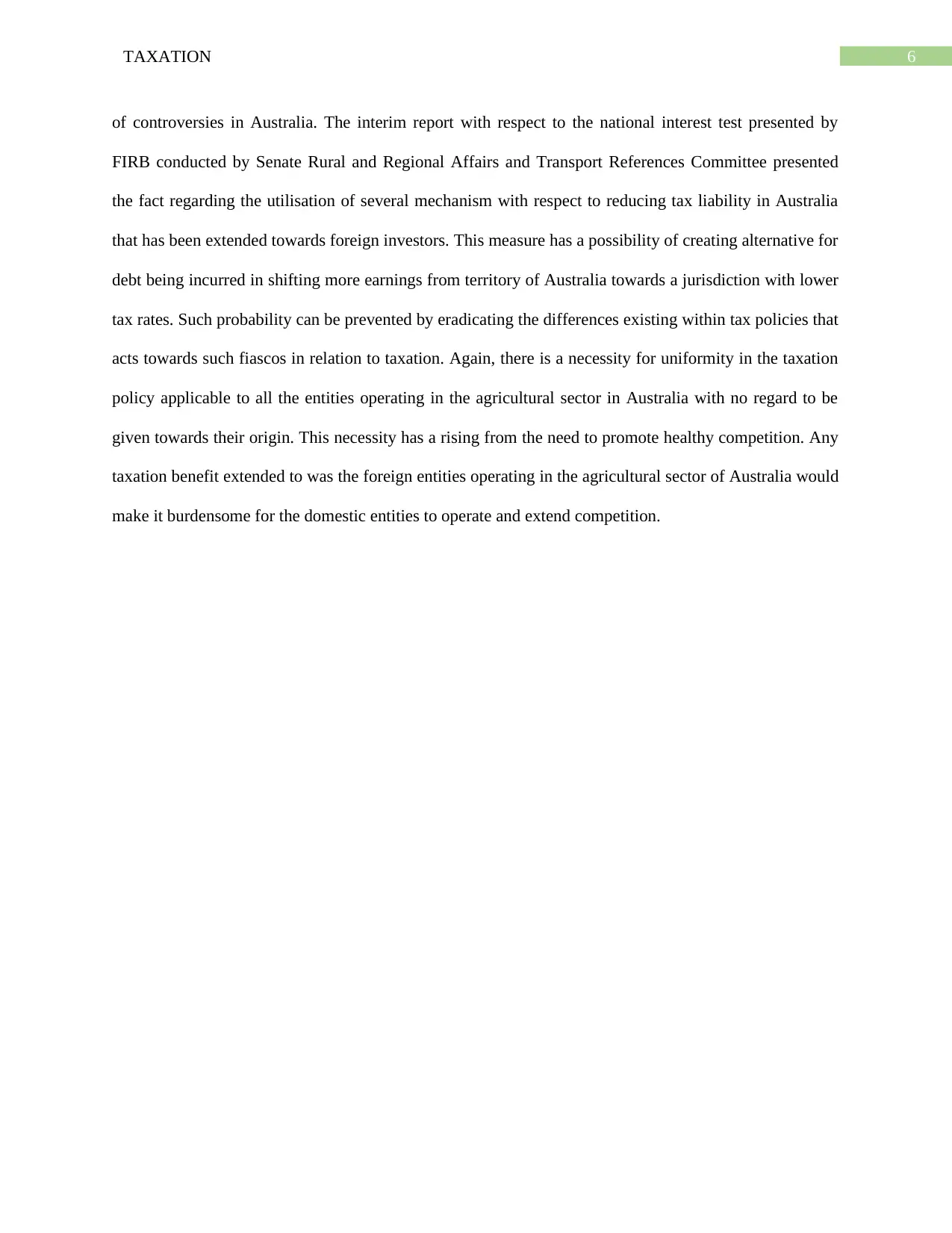
6TAXATION
of controversies in Australia. The interim report with respect to the national interest test presented by
FIRB conducted by Senate Rural and Regional Affairs and Transport References Committee presented
the fact regarding the utilisation of several mechanism with respect to reducing tax liability in Australia
that has been extended towards foreign investors. This measure has a possibility of creating alternative for
debt being incurred in shifting more earnings from territory of Australia towards a jurisdiction with lower
tax rates. Such probability can be prevented by eradicating the differences existing within tax policies that
acts towards such fiascos in relation to taxation. Again, there is a necessity for uniformity in the taxation
policy applicable to all the entities operating in the agricultural sector in Australia with no regard to be
given towards their origin. This necessity has a rising from the need to promote healthy competition. Any
taxation benefit extended to was the foreign entities operating in the agricultural sector of Australia would
make it burdensome for the domestic entities to operate and extend competition.
of controversies in Australia. The interim report with respect to the national interest test presented by
FIRB conducted by Senate Rural and Regional Affairs and Transport References Committee presented
the fact regarding the utilisation of several mechanism with respect to reducing tax liability in Australia
that has been extended towards foreign investors. This measure has a possibility of creating alternative for
debt being incurred in shifting more earnings from territory of Australia towards a jurisdiction with lower
tax rates. Such probability can be prevented by eradicating the differences existing within tax policies that
acts towards such fiascos in relation to taxation. Again, there is a necessity for uniformity in the taxation
policy applicable to all the entities operating in the agricultural sector in Australia with no regard to be
given towards their origin. This necessity has a rising from the need to promote healthy competition. Any
taxation benefit extended to was the foreign entities operating in the agricultural sector of Australia would
make it burdensome for the domestic entities to operate and extend competition.
Paraphrase This Document
Need a fresh take? Get an instant paraphrase of this document with our AI Paraphraser
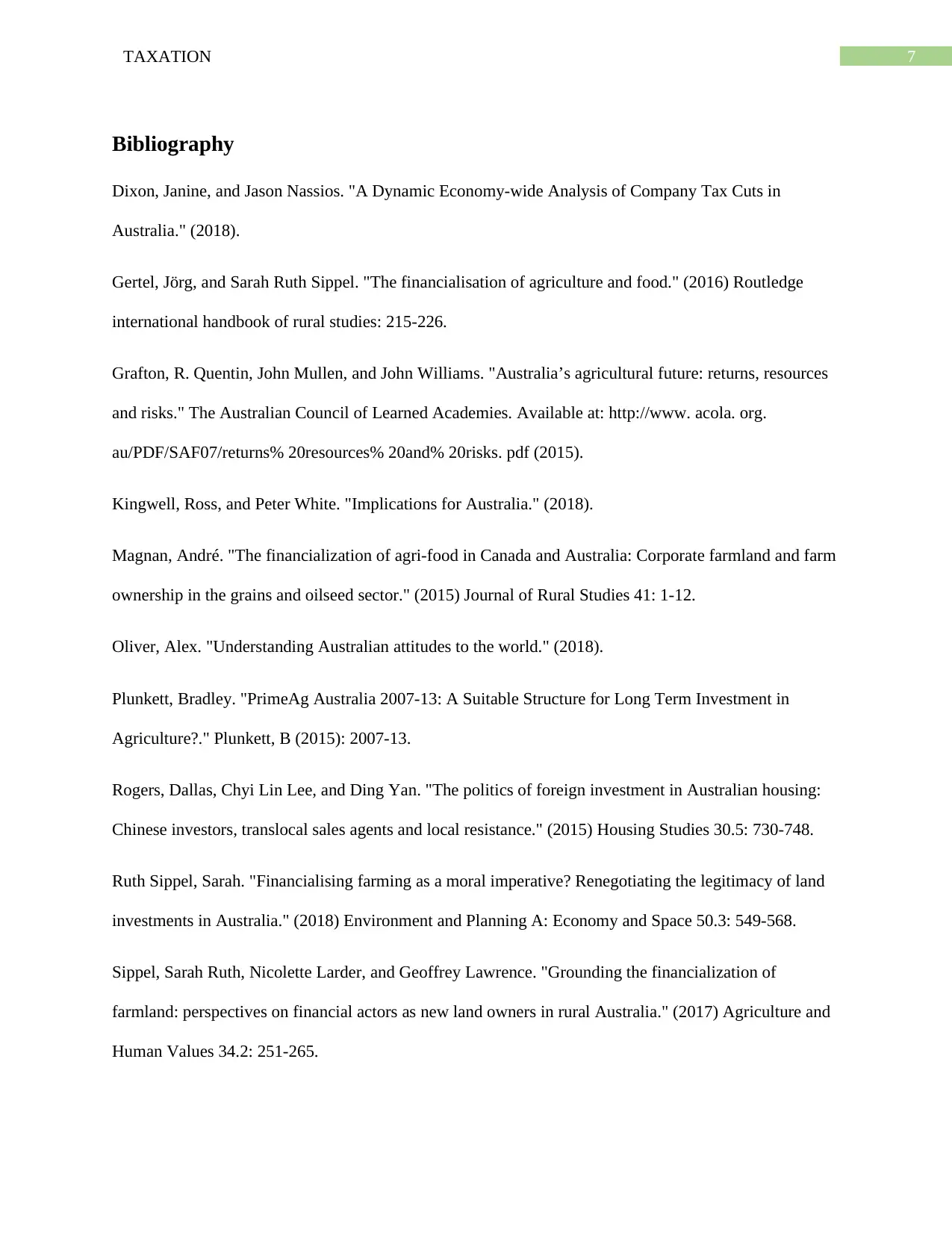
7TAXATION
Bibliography
Dixon, Janine, and Jason Nassios. "A Dynamic Economy-wide Analysis of Company Tax Cuts in
Australia." (2018).
Gertel, Jörg, and Sarah Ruth Sippel. "The financialisation of agriculture and food." (2016) Routledge
international handbook of rural studies: 215-226.
Grafton, R. Quentin, John Mullen, and John Williams. "Australia’s agricultural future: returns, resources
and risks." The Australian Council of Learned Academies. Available at: http://www. acola. org.
au/PDF/SAF07/returns% 20resources% 20and% 20risks. pdf (2015).
Kingwell, Ross, and Peter White. "Implications for Australia." (2018).
Magnan, André. "The financialization of agri-food in Canada and Australia: Corporate farmland and farm
ownership in the grains and oilseed sector." (2015) Journal of Rural Studies 41: 1-12.
Oliver, Alex. "Understanding Australian attitudes to the world." (2018).
Plunkett, Bradley. "PrimeAg Australia 2007-13: A Suitable Structure for Long Term Investment in
Agriculture?." Plunkett, B (2015): 2007-13.
Rogers, Dallas, Chyi Lin Lee, and Ding Yan. "The politics of foreign investment in Australian housing:
Chinese investors, translocal sales agents and local resistance." (2015) Housing Studies 30.5: 730-748.
Ruth Sippel, Sarah. "Financialising farming as a moral imperative? Renegotiating the legitimacy of land
investments in Australia." (2018) Environment and Planning A: Economy and Space 50.3: 549-568.
Sippel, Sarah Ruth, Nicolette Larder, and Geoffrey Lawrence. "Grounding the financialization of
farmland: perspectives on financial actors as new land owners in rural Australia." (2017) Agriculture and
Human Values 34.2: 251-265.
Bibliography
Dixon, Janine, and Jason Nassios. "A Dynamic Economy-wide Analysis of Company Tax Cuts in
Australia." (2018).
Gertel, Jörg, and Sarah Ruth Sippel. "The financialisation of agriculture and food." (2016) Routledge
international handbook of rural studies: 215-226.
Grafton, R. Quentin, John Mullen, and John Williams. "Australia’s agricultural future: returns, resources
and risks." The Australian Council of Learned Academies. Available at: http://www. acola. org.
au/PDF/SAF07/returns% 20resources% 20and% 20risks. pdf (2015).
Kingwell, Ross, and Peter White. "Implications for Australia." (2018).
Magnan, André. "The financialization of agri-food in Canada and Australia: Corporate farmland and farm
ownership in the grains and oilseed sector." (2015) Journal of Rural Studies 41: 1-12.
Oliver, Alex. "Understanding Australian attitudes to the world." (2018).
Plunkett, Bradley. "PrimeAg Australia 2007-13: A Suitable Structure for Long Term Investment in
Agriculture?." Plunkett, B (2015): 2007-13.
Rogers, Dallas, Chyi Lin Lee, and Ding Yan. "The politics of foreign investment in Australian housing:
Chinese investors, translocal sales agents and local resistance." (2015) Housing Studies 30.5: 730-748.
Ruth Sippel, Sarah. "Financialising farming as a moral imperative? Renegotiating the legitimacy of land
investments in Australia." (2018) Environment and Planning A: Economy and Space 50.3: 549-568.
Sippel, Sarah Ruth, Nicolette Larder, and Geoffrey Lawrence. "Grounding the financialization of
farmland: perspectives on financial actors as new land owners in rural Australia." (2017) Agriculture and
Human Values 34.2: 251-265.
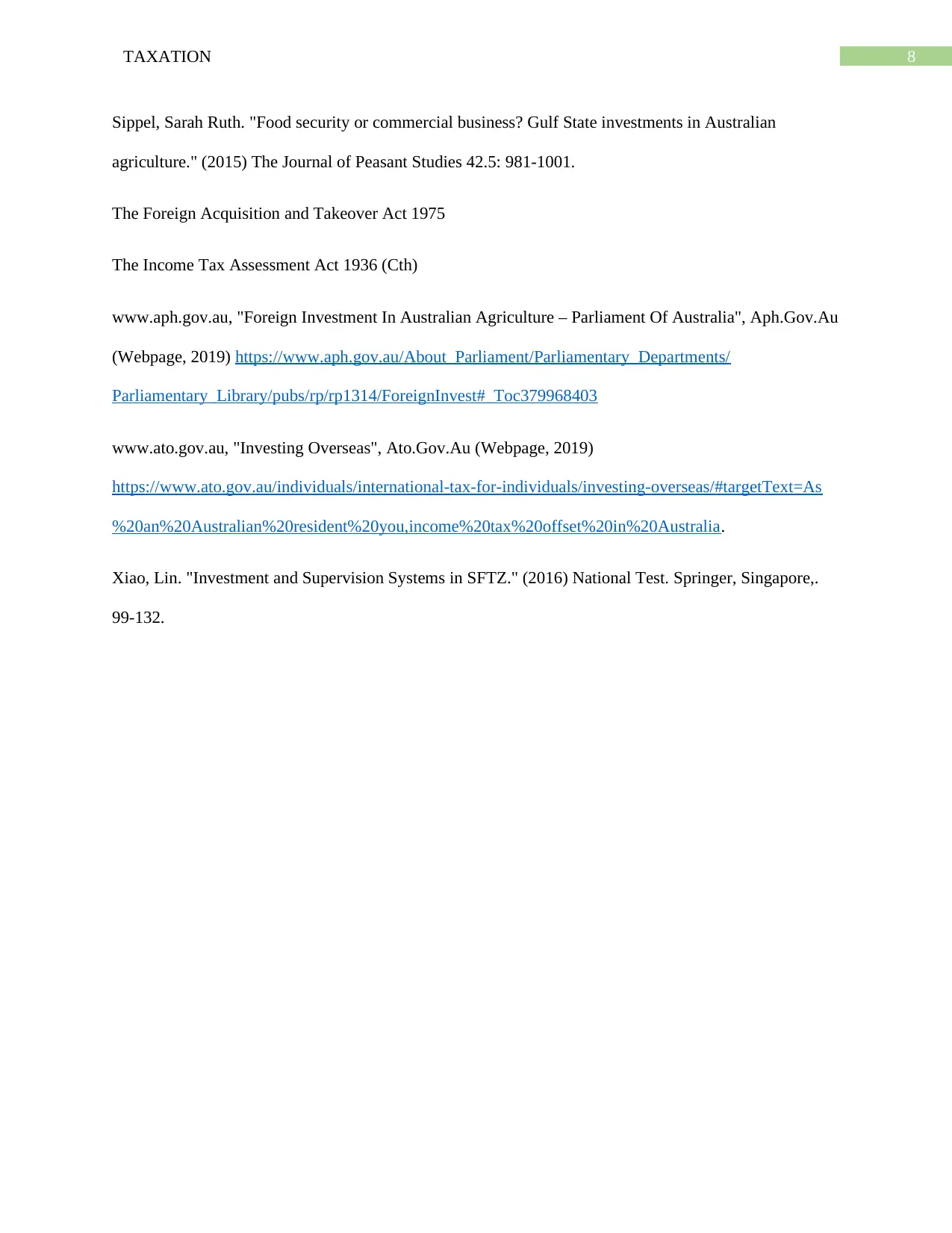
8TAXATION
Sippel, Sarah Ruth. "Food security or commercial business? Gulf State investments in Australian
agriculture." (2015) The Journal of Peasant Studies 42.5: 981-1001.
The Foreign Acquisition and Takeover Act 1975
The Income Tax Assessment Act 1936 (Cth)
www.aph.gov.au, "Foreign Investment In Australian Agriculture – Parliament Of Australia", Aph.Gov.Au
(Webpage, 2019) https://www.aph.gov.au/About_Parliament/Parliamentary_Departments/
Parliamentary_Library/pubs/rp/rp1314/ForeignInvest#_Toc379968403
www.ato.gov.au, "Investing Overseas", Ato.Gov.Au (Webpage, 2019)
https://www.ato.gov.au/individuals/international-tax-for-individuals/investing-overseas/#targetText=As
%20an%20Australian%20resident%20you,income%20tax%20offset%20in%20Australia.
Xiao, Lin. "Investment and Supervision Systems in SFTZ." (2016) National Test. Springer, Singapore,.
99-132.
Sippel, Sarah Ruth. "Food security or commercial business? Gulf State investments in Australian
agriculture." (2015) The Journal of Peasant Studies 42.5: 981-1001.
The Foreign Acquisition and Takeover Act 1975
The Income Tax Assessment Act 1936 (Cth)
www.aph.gov.au, "Foreign Investment In Australian Agriculture – Parliament Of Australia", Aph.Gov.Au
(Webpage, 2019) https://www.aph.gov.au/About_Parliament/Parliamentary_Departments/
Parliamentary_Library/pubs/rp/rp1314/ForeignInvest#_Toc379968403
www.ato.gov.au, "Investing Overseas", Ato.Gov.Au (Webpage, 2019)
https://www.ato.gov.au/individuals/international-tax-for-individuals/investing-overseas/#targetText=As
%20an%20Australian%20resident%20you,income%20tax%20offset%20in%20Australia.
Xiao, Lin. "Investment and Supervision Systems in SFTZ." (2016) National Test. Springer, Singapore,.
99-132.
⊘ This is a preview!⊘
Do you want full access?
Subscribe today to unlock all pages.

Trusted by 1+ million students worldwide
1 out of 9
Related Documents
Your All-in-One AI-Powered Toolkit for Academic Success.
+13062052269
info@desklib.com
Available 24*7 on WhatsApp / Email
![[object Object]](/_next/static/media/star-bottom.7253800d.svg)
Unlock your academic potential
Copyright © 2020–2026 A2Z Services. All Rights Reserved. Developed and managed by ZUCOL.





